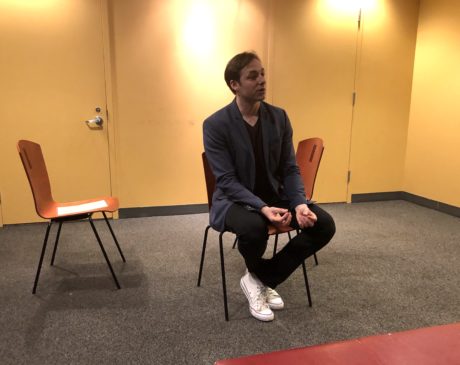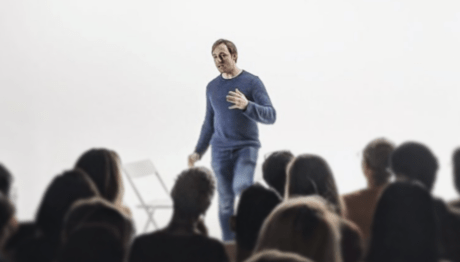Post-Play Palaver is an occasional series of conversations between DC Theater Arts writers who saw the same performance, got really into talking about it, and decided to continue their exchange in writing. That’s what happened when Senior Writers and Columnists Sophia Howes (Dangereuse) and John Stoltenberg (Magic Time!) participated in Second Body, a unique immersive theatrical event and personal communication experience.
Second Body utilizes some basic audio technology to allow two volunteers in two different spaces to conduct a conversation with each other through two entirely different people—actors who function as living avatars. Synetic Theatre is presenting demonstrations of the performance experience in conjunction with its run of Richard iii.
John and Sophia, who had both seen Richard iii, attended Second Body intending only to observe and not take part. But after watching two volunteers go through it, they decided to give it a try. The transformative experience they each had surprised them both.

John: It took me a while to figure out what in the world this was. Initially, even the tech setup was perplexing. The very personable facilitator-host, Arlo Hill (an actor himself), welcomed everyone, gave us some high-concept framing for what was about to transpire, and explained what would happen. He would ask for two volunteers (I’ll call them A and B). Volunteer A would stay in the lobby and Volunteer B would go to another room. Each would wear a headset mic that would transmit what they say to one of two actors wearing an earpiece. (The actors were from the Richard iii cast.) The actor hearing Volunteer A’s voice would speak the words back simultaneously to Volunteer B. Similarly, the actor hearing Volunteer B’s voice would speak the words back simultaneously to Volunteer A.
Frankly, this didn’t make much tangible sense until I watched two volunteers—who didn’t happen to know each other—go through it. And then something changed for me, relaxed in me. Maybe it was Hill’s warm and reassuring manner or maybe the simple free will and transparency in what I saw and heard, but this suddenly seemed safe enough to try. And I turned to you and asked you if you’d like to try it too. What were you thinking?
Sophia: I was thinking, I hope John doesn’t rope me into this! But I really enjoyed the first two sets of volunteers. And this new type of theater is really intriguing. So I thought, as long as I don’t have to be the one on stage I’ll give it a try.
I was led into a back room and provided with a headset microphone attached to a transmitter. I was still a bit confused about what I was supposed to do, but eventually, I figured it out. I was sitting opposite an actress who would be speaking John’s words. He would be on stage opposite an actress who would be speaking my words. I had no idea what we would talk about, or how in-depth our conversation would turn out to be.
At first, we talked a bit about Richard iii, which we both admired. But then John floored me with the following remark. “We have both lost significant others. Maybe we can talk about that.”
John: I know, I was surprised I said that too. But it didn’t come out of the blue. It came from the experience of talking to you, whom I knew, as if you were present. And somehow, strangely, that put me in mind of conversations I’ve had in my mind with the loved one I lost…as if she were still present.
It all started when we were chit-chatting about Richard iii. I remember I asked “you” (the actor opposite me) what the heck Second Body had to do with that show. (In my own mind: not much.) Then “you” (the actor) gave a very smart answer, so typical of you. It was about how Richard is played as a cyborg, a semi-artificial being, not in his own body, or something like that. Sorry if I can’t remember exactly what you said because something else was going on that was blowing me away. As I listened to the actor say the smart things you said, I recognized you as you, even though you were not there.
Then weirdly I was reminded of something. It was a story I’d never told you, but there was something about talking to you this way made me want to tell it now.

Not long ago I was walking in Penn Quarter and a young man came up to me on the street, called my name, knew me. But I didn’t recognize him and kind of stared at him blankly. Then he said, “Oh, sorry, you didn’t know” (or words to that effect), and explained that he had transitioned since I knew him years before as a female coworker. And sure enough, as soon as he said that, I recognized the person I knew, not from how he looked (which was now very different) but from some sense I instantly recalled, of—what?—his central self? his core character? his distinctive chuckle? I don’t know. All I knew is that I immediately relaxed and said, “Oh, hi, so good to see you again!”
All of this is to retrace the uncanny pathway whereby this Second Body experience led me to think and talk about something I have rarely shared—and certainly something you and I have never discussed: my waking and dreaming conversations with someone I knew and who knew me for 31 years whom I sometimes still believe I am communicating with. In that strangely transcendent but absolutely real Second Body moment, I knew that you as my friend would understand exactly what I was talking about—even though I was telling this all to a perfect stranger.
Sophia: I think loss as a subject makes many people uncomfortable. And, with a friend, you don’t want to hurt that person’s feelings by bringing it up. If you had actually been there, I don’t think we would have talked about it. But because it was someone else’s body and not you, I had a different reaction. When you mentioned conversations with your lost loved one, I felt free to express how I really felt.
It was a relief to hear about your conversations. I have them with my late husband, who passed away three years ago from brain cancer. I usually focus on trying to convince him that I am doing well and handling things just fine, for myself and as a mom.
Of course, that’s not always true! But it makes me feel better to say it.
John: I agree, what we said to each other during Second Body is not something we would be likely to have said face to face. And if even if we ever did, I doubt it would be with the same sense of ease and lightness I felt confiding in this way—all while addressing an actor I didn’t know and in front of an audience of people I’d never met in my life!
It was totally unlike conversing on the phone or instant message or even FaceTime, because the voice I heard was someone else’s—but I totally knew it was coming from you. Afterward in a talkback, someone mentioned being reminded of a seance—but that wasn’t what it was for me either. A seance connotes some otherworldly, out-of-body intervention. For me the Second Body experience was completely different: more like an unexpected opening in my life, a chance to access and consciously accept with grace something in myself, something true to me, something that it turns out I wasn’t yet on intimate speaking terms with: my own constant capacity to recall someone not physically present but still living in my heart and mind.
I’ve had a lot of peak emotional experiences in live theater. That’s why I keep going, hoping it will happen again. And it does, striking like lightning in lots of ways. Apparently, the Second Body communication you and I shared was very emotional for those watching. Arlo for one was in tears. But I can honestly say I’ve never had a more personal or more emotionally freeing theatrical experience than I had in the subjective trust I felt that I could truly talk with someone I knew who was not literally there. And that was the key. It was not grieving. It was freeing.
Running Time: About an hour.

Second Body is performed/demonstrated through June 16, 2019, at Synetic Theater, 1800 South Bell Street, Arlington, VA. Tickets are available online.
Everyone’s personal experience of Second Body will be different. Here’s more about what to expect from the Synetic Theatre website:
Incubated and developed at Sightline Arts through a yearlong initiative exploring the shifting divide between the virtual and the real, Second Body is a hybrid of communications technology and old-fashioned face to face conversation, in the format of a live performative event. At a Second Body event, the audience is witness to a surreal encounter: two volunteers in two different spaces engage in a conversation through the bodies of two entirely different people. This overlaying of multiple conflicting identities and relationships onto a single pair of individuals creates a strange, disorienting, thrilling, and often unexpectedly hilarious experience—prompting a whole range of social, political, technological, and philosophical questions. Imagine speaking to your friend, your child, your spouse, in a different body. What impossible conversations might be possible?





